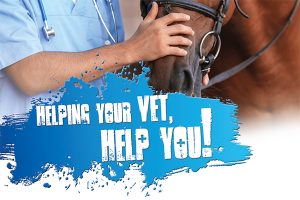Helping Your Vet Help You!
Click here to read the complete article
178 – September/October, 2025
You, of course, take care of your horse’s daily needs including the feeding, grooming, training, and exercising. However, it is your veterinarian that handles the ailments, injuries, and any disease that may infect the horse. This, quite likely, makes your vet the second most important person in your horse’s life in terms of health and welfare.
And, just like everyone else, your veterinarian is a very busy person. Moving from patient to patient, going from routine to challenging cases and back again, the successful vet must juggle the needs of multiple patients in an often-unpredictable fashion. Even when he or she starts the day with a schedule of appointments, just one emergency can put your vet off schedule for the rest of the day.
Given the facts, it makes sense to do what you can to make your vet’s job easier. Here are ten ways to prepare; so on your next visit to the vet, he or she can focus on what’s important–your horse’s well-being.
Know your horse’s vital signs
Click here to read the complete article
178 – September/October, 2025











